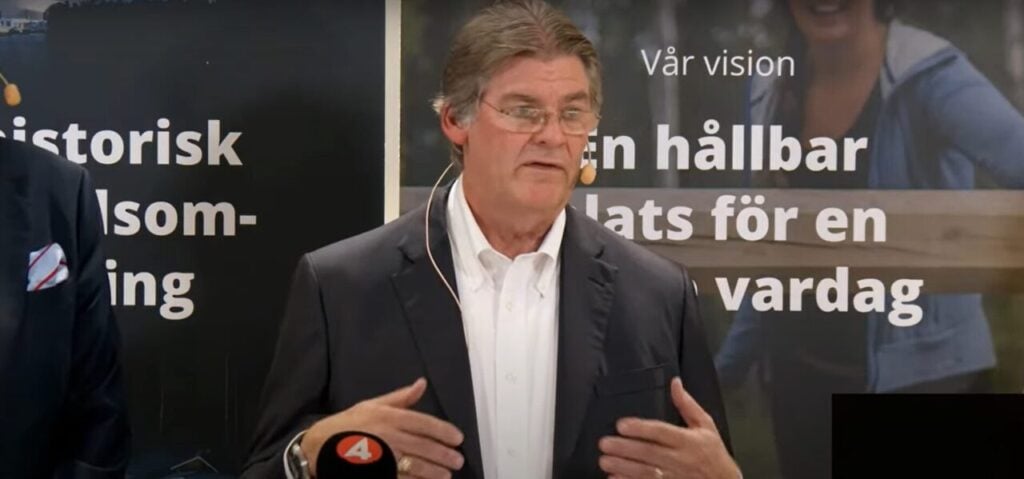

We hear from US-based lithium sulfur battery firm Lyten executives about the firm’s deal to take ownership of European battery firm Northvolt out of bankruptcy.
Lyten acquired Northvolt’s lithium-ion gigafactories in Sweden and Germany last week, following its acquisition of its Poland-based battery energy storage system (BESS) assembly business a month earlier – both deals are subject to regulatory approval.
In a press conference on Friday (8 August), the day after the Sweden and Germany announcement, executives from the companies, the administrators and the Swedish government discussed the news and its significance. See our coverage of the headline takeaways from that in our piece published on the day, with further comments from Lyten CEO Dan Cook on its plans with the Northvolt assets in this article.
Between the two announcements, Energy-Storage.news also interviewed Lyten sustainability and chief business officer (CBO) Keith Norman about its plans with the BESS division specifically. You can see a video recording of the latter further down.
Try Premium for just $1
- Full premium access for the first month at only $1
- Converts to an annual rate after 30 days unless cancelled
- Cancel anytime during the trial period
Premium Benefits
- Expert industry analysis and interviews
- Digital access to PV Tech Power journal
- Exclusive event discounts
Or get the full Premium subscription right away
Or continue reading this article for free
Poland BESS manufacturing plans
The acquisition of Northvolt’s BESS business in Gdansk puts it among a small number of firms with sizeable grid-scale manufacturing capacity in Europe. Other notable ones are IPS, Nidec ASI, Tesvolt, Fluence and Ingeteam.
Norman said the Gdansk facility has equipment installed and commissioned for 3GWh of annual production capacity, with another 3GWh there but not yet commissioned.
“The facility was shut down as part of the bankruptcy. Once we close, we will immediately ramp bank up and bring those lines online. It’s about 1.5 years to go from initial restart to get to full capacity,” he explained.
“That ramp-up will be lined up with the demand side of the equation: the products being produced were already on the third generation, and we are inheriting those customers via the pipeline of customers from Northvolt, which will combine with Lyten’s customers that were waiting for us to have capacity. That pipeline covers 18 countries.”
Deliveries are expected to resume in Q4 this year.
The main product the facility produces is a modular BESS, comprised of a ‘hub’ with five modules installed on top, each totalling 250kWh adding up to 1.25MWh per 20-foot unit. It was designed for the commercial & industrial (C&I) market, to be highly modular and plug-and-play with little set-up cost, Norman said. It has the potential to sell to utilities too, for ‘near-the-meter’ projects.
A further production generation down the line would comprise 3-4MWh per unit.
‘Great asset with supply chains, designs and a backlog in place’
“There’s a logic that we have been able to identify a great asset: it’s got its supply chains, designs in place, a backlog in place, makes sense to turn it straight back on. This is a business-driven decision,” Norman said.
“For lithium sulfur we are in the scaling phase. We are the only commercial manufacturer of lithium sulfur batteries, but need a bit of time to get that manufacturing base to meet the demand. This gives us an avenue to ramp-up manufacturing while we develop the lithium-sulfur tech. We will maintain the lithium-ion product and bring in the lithium-sulfur product, with a pack design that can fit into the lithium-ion BESS design.”
The firm is not putting a timeline on bringing the lithium sulfur tech in, however. Norman emphasised that the strategy is to not overbuild relative to demand, which de-risks the investments.
Northvolt to continue independent technology approach
Cook said in the press conference that the challenges around low yields from Northvolt’s manufacturing has partially been solved in the past year. Discussing executing on the ramp-up more broadly, he indicated, as Norman did, that the firm would take a very cautious approach.
“One production line has been qualified for a leading customer, and four more are near qualification. We are buying a lot more than 1GWh, we are buying know-how about how to get that facility up and running,” Cook said.
“But we’ll do it 1GWh at a time, with focus, and a step-by-step achievement of incremental volumes. From my own experience, scaling factories is about focus.”
A journalist present then pointed out that Northvolt’s very problem was in scaling.
Cook responded: “There is a lot in scaling. There is a lot to achieve around equipment, reliability, people who operate it, relationships with customers. Many of these have been tackled in the last 12 months.
“I am an engineer, and these are my concerns, and we looked at it very carefully. We have people who have brought gigafactories to scale. We bring that expertise that recognises good talent and equipment. I know how to make this work ahead of time, or I wouldn’t have led our investors in this direction.”
The same journalist, pressing home the point, asked if Lyten would be bringing in its own leadership to do this or if would co-operate with an established lithium-ion OEM that had a track record in scaling battery manufacturing such as China-based CATL, the world’s largest battery manufacturer.
It was a highly topical question since some new entrants to the European battery manufacturing industry, like UK firm Volklec and Norwegian firm Elinor, are choosing to partner with and license technology from Chinese companies rather than go independently as Northvolt did.
While supply chains and price competition from China and the US (thanks to the 45x tax credit) were seen as the European industry’s main challenges in 2022-2024, Northvolt’s (and other companies’) challenges in scaling have pointed to the continent’s lack of technical battery manufacturing expertise as another key issue.
In response to the question, Cook said unequivocally: “You have a very talented group of employees sitting here and in Vasteras (Northvolt’s R&D lab, also acquired). These are some of the best talent we’ve seen.”
“I may hurt some people’s feelings in the room. CATL will not be part of this factory, and CATL will not be part of Vasteras.”
“There is no reason with lithium sulfur and existing tech to rely any more than we have been on foreign partners.”
“We need energy independence, we have an opportunity to do it and we owe it to ourselves, the communities and investors to make that real.”
